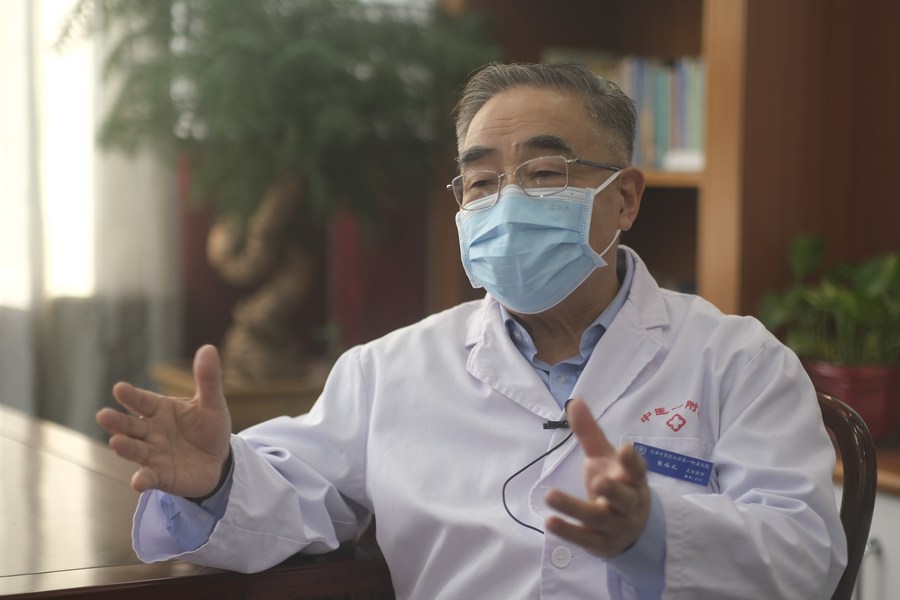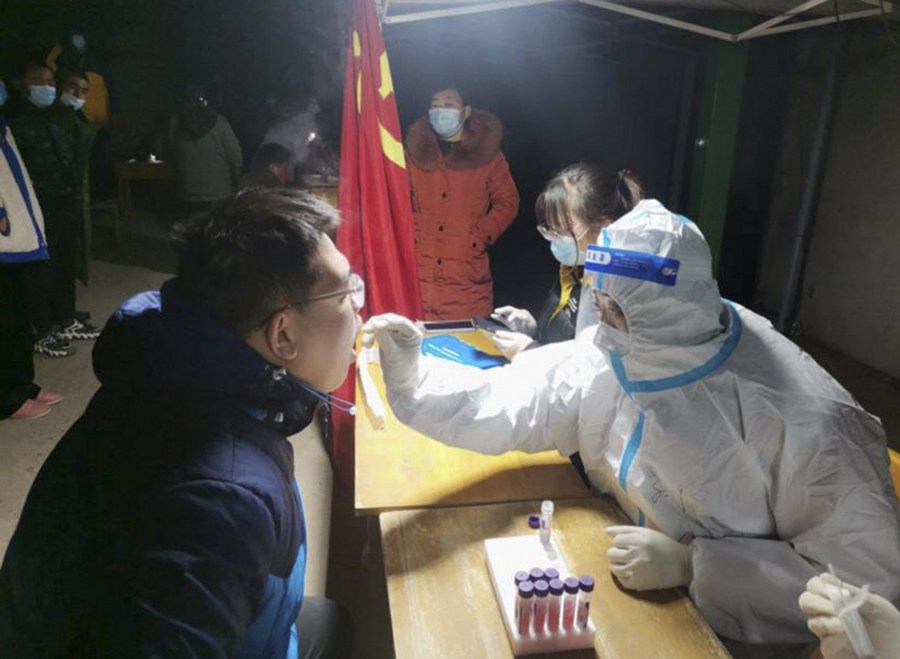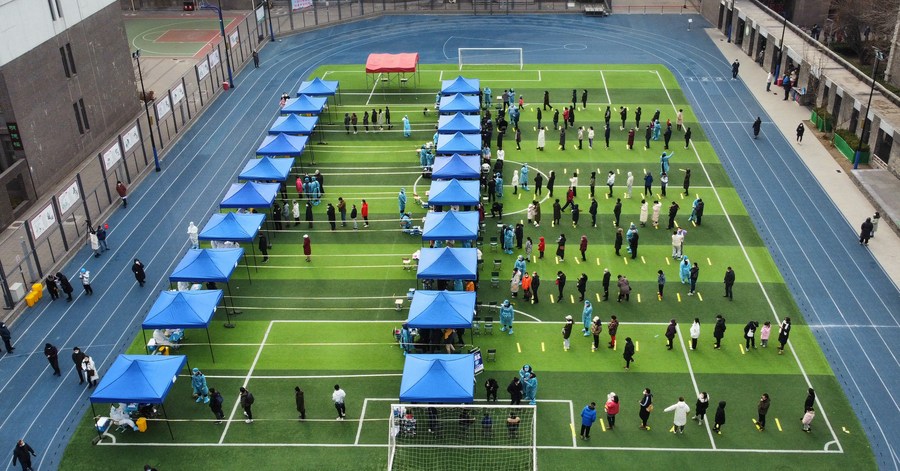Why is China's zero-COVID-19 approach effective against Omicron variant?
-- Following the Omicron outbreak, Tianjin, with a population of about 14 million, immediately took action to block the spread of the epidemic.
-- Faced with this new threat, all of the local governments have stuck to their usual zero-COVID-19 approach.
-- By putting people's lives first, China has implemented the "dynamic zero-case policy" to maintain the normal functioning of society and promote economic development at the same time.
TIANJIN, Jan. 12 (Xinhua) -- Minasyan Anush, an Armenian who lives in north China's Tianjin Municipality, no longer feels anxious after receiving her negative test result for COVID-19.
A student at Nankai University, Minasyan was a little worried after news on Sunday that two cases of the Omicron variant had been confirmed in Tianjin, which neighbors Beijing.
"I knew that the world is now facing the new Omicron variant, which is transmitted much faster than any other COVID-19 variants that have emerged before," she said.
However, the local government's rapid response over the following three days gave the 26-year-old girl a much-increased sense of safety.
ZERO-COVID-19 APPROACH
Following the Omicron outbreak on Sunday, Tianjin, with a population of about 14 million, immediately took action to block the spread of the epidemic, asking local residents not to leave the city unless necessary.
On Wednesday, the municipality launched the second round of citywide mass nucleic acid testing, following close behind the first round, which started early Sunday, amid efforts to find out possible infections and quickly contain the epidemic.

A medical worker takes a swab sample from a citizen at a COVID-19 testing site in Binhai New Area in north China's Tianjin, Jan. 9, 2022. (Xinhua/Zhao Zishuo)
Although the total number of local cases in the latest flare-up in Tianjin has increased to 137 as of Wednesday, Minasyan felt at ease, knowing that the tally will be cleared to zero soon.
The Omicron variant hit Tianjin and central China's Henan Province in early 2022, while the Delta variant epidemic in northwest China's Shaanxi Province had not yet ended. Faced with this new threat, all of the local governments have stuck to their usual zero-COVID-19 approach.
"China has adopted the approach of 'dynamic zero-case policy' for two years, and this has proved to be successful. We must continue to put people's lives first," said Zhang Boli, an academician with the Chinese Academy of Engineering and recipient of the national honorary title "the People's Hero" for his outstanding anti-epidemic efforts.

Zhang Boli, an academician with the Chinese Academy of Engineering, speaks in an interview with Xinhua on Jan. 11, 2022. (Photo by Hao Jie/Xinhua)
According to data from Johns Hopkins University, the number of confirmed COVID-19 cases globally has exceeded 313 million, as of Wednesday.
But Zhang believes that seeking "herd immunity" is an irresponsible approach in terms of protecting people's lives and health.
"It is inappropriate to regard Omicron as 'flu with a larger size'," said Zhang. Although the symptoms caused by Omicron are mild, it can still cause serious harm to middle-aged and elderly people.
In the city of Anyang, in central China's Henan Province, 123 local COVID-19 cases have been registered since the first case was reported on Saturday.
The first cases in Anyang are believed to be linked with the same transmission chain of the Omicron variant in Tianjin, according to the publicity department of the Anyang municipal government.

A medical worker takes a swab sample from a resident at a COVID-19 testing site in Baoliansi Township in Anyang, central China's Henan Province, Jan. 10, 2022. (Xinhua)
On Monday evening, the Anyang municipal government ordered all vehicles off roads and required all residents to stay put for epidemiological investigation and nucleic acid testing.
"We will take firm and decisive measures to break the chain of transmission of the virus," said Gao Yong, mayor of Anyang. "We must put people's lives first."
LIFE FIRST
Shortly after an epidemic emerged in Xin'an County in the city of Luoyang in Henan Province, more than 2,500 medical workers from different hospitals in Luoyang rushed to the county to join the battle against the virus.
On New Year's Day, the first day of her arrival, Xiao Xiaoniu, a nurse from the Songxian County People's Hospital, worked till 10 p.m. together with her colleagues. They collected 1,600 samples for nucleic acid testing. Xiao forgot that it was her birthday until a colleague reminded her.
In Tianjin and Henan, lots of communities have worked to ensure that vulnerable groups would be tested first in the mass nucleic acid tests and would not be left waiting in the freezing weather.

Aerial photo taken on Jan. 9, 2022 shows a COVID-19 testing site in Nankai District of north China's Tianjin. (Xinhua/Sun Fanyue)
Many residents joined in the fight voluntarily. Zong Di, one of the volunteers in Tianjin, went door-to-door to help residents register for nucleic acid testing and cope with their troubles.
"Before you know it, the day is over," Zong said.
By putting people's lives first, China has implemented the "dynamic zero-case policy" to maintain the normal functioning of society and promote economic development at the same time.
In response to the COVID-19 outbreak, the Tianjin municipal authorities have used both online and offline channels to ensure citizens get daily necessities. People mostly place their orders online and receive their deliveries from neighborhood outlets.

Residents select vegetables in a shop in north China's Tianjin, Jan. 11, 2022. (Xinhua/Li Ran)
According to the Tianjin municipal bureau of commerce, local authorities have mobilized major wholesale suppliers, supermarkets and vegetable markets to add inventory in order to cope with the market demand for meat, eggs and vegetables.
"There is a supermarket in our community supplying meat, eggs and vegetables for us. The price is rather stable and we don't need to go out to buy daily necessities," said Ma Xiaodong, who lives in the Jinnan District of Tianjin.
Photos
Related Stories
- Over 2.91 bln COVID-19 vaccine doses administered on Chinese mainland
- China's Dalian sees 2 test positive for COVID-19
- World Bank slashes global growth forecast amid new pandemic waves
- North China's Tianjin to launch second citywide nucleic acid testing
- Vaccination a necessary measure to deal with Omicron: expert
Copyright © 2022 People's Daily Online. All Rights Reserved.










